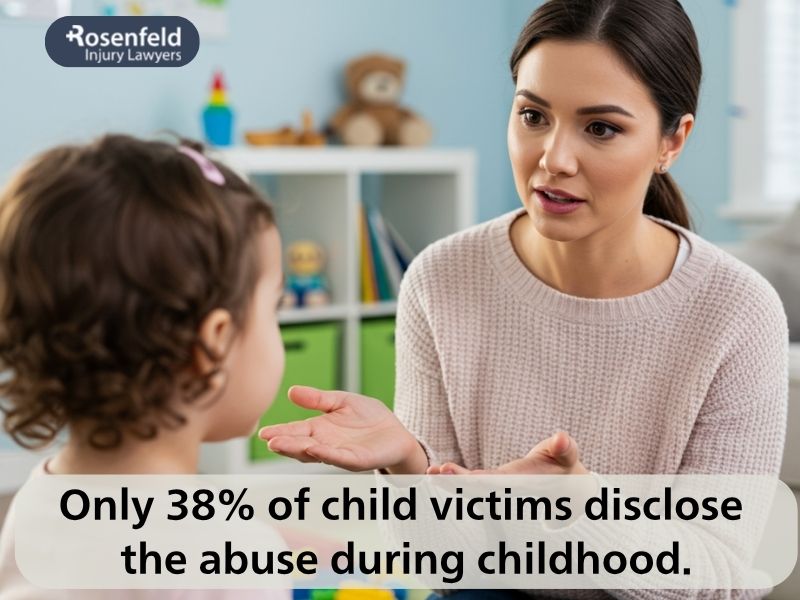- Free Case Evaluation 866-757-6452 Tap Here To Call Us
Child Sexual Abuse

Child sexual abuse is a severe form of child abuse that involves any sexual activity with a minor, including sexual touching, exposure to pornography, or forcing a child to undress or engage in sexual acts. It often involves manipulation or coercion, and the perpetrator is frequently someone the child knows and trusts, such as a family member or adult in a position of authority.
Sadly, many children are sexually abused without ever disclosing it. This guide is meant to support survivors, families, and advocates by explaining the different forms of abuse, common warning signs, lasting impacts, and legal options available to seek accountability and support.
What Is Child Sexual Abuse?
Child sexual abuse refers to any sexual act involving a child, whether through physical contact or non-contact behaviors intended for an adult’s sexual pleasure.
This includes sexual touching, penetration, exposing a child to pornography, asking a child to engage in sexual activity, or encouraging a child to behave sexually. Adults or older children can carry out abuse and often involves manipulation, secrecy, or coercion.
While many cases happen within families, sometimes by a parent, sibling, or other family member, abuse also occurs in schools, religious institutions, foster care, and online environments. Any behavior of a sexual nature involving a child is abuse, regardless of whether physical force is used.
Types of Sexual Assault and Abuse Against Children
Child sexual abuse takes many forms, each of which is deeply harmful to a child’s well-being.
Molestation involves any unwanted sexual touching or fondling of a child’s private areas, while rape refers to forced or coerced sexual penetration.
Indecent exposure occurs when an adult exposes their genital area to a child or asks the child to expose themselves.
Grooming is a manipulative process where an adult gains a child’s trust, often through attention, gifts, or secrecy, to prepare them for abuse.
Exploitation includes using a child for pornography or sexual services.
Online abuse may involve sexual messages, coercion to share explicit images, or live-streamed sexual acts. Increasingly, survivors and their families are pursuing legal claims for Roblox child exploitation, highlighting how predators use gaming platforms to target and groom minors.
Any sexual activity involving a child, whether physical or not, is abuse.

The Mental Health Impact on Survivors
Child sexual abuse can leave deep and lasting scars on a survivor’s mental health.
Many survivors experience post-traumatic stress disorder (PTSD), anxiety, depression, and dissociation well into adulthood. The trauma may also lead to difficulty forming relationships, low self-esteem, chronic fear, or trouble trusting others. Suicidal thoughts are not uncommon, especially in cases where the abuse was ongoing or involved a trusted adult or family member.
Survivors may struggle with flashbacks, shame, or emotional numbness, often without fully understanding the root cause. These mental health effects can impact every part of life—from school and work to friendships and intimacy—making early intervention, support, and access to trauma-informed care essential for healing.
Who Is at Increased Risk of Child Sexual Abuse?
Certain children face an increased risk of child sexual abuse due to their circumstances.
Those in foster care, living with disabilities, experiencing homelessness, or isolated from trusted adults and support systems are especially vulnerable. Predators may more easily target children who lack stable housing, emotional support, or consistent supervision.
Abusers often seek out children who are less likely to report or be believed, using their vulnerabilities to manipulate and control them. These children may also face barriers to disclosing abuse or accessing help. Protecting at-risk children requires strong support systems, safe environments, and early education about appropriate boundaries and trusted adults.
How to Prevent Child Sexual Abuse
Preventing child sexual abuse starts with awareness and proactive steps by adults. Education plays a key role—teaching children about body parts, boundaries, and what kind of touch is never okay.
Parents and caregivers should maintain open communication and supervise interactions, especially with adults or older children. Conducting background checks for babysitters, coaches, and other caregivers helps identify risks early. Empowering children to speak up when something feels wrong builds confidence and safety.
Warning signs like sudden behavior changes, inappropriate sexual knowledge, or bed wetting should never be ignored. Report suspected child abuse immediately to child protective services or law enforcement.
Keeping Children Safe in the Digital and Physical World
Keeping children safe means protecting them both offline and online.
Encourage open conversations about body safety, personal boundaries, and the difference between secrets and surprises. Teach children that no one should touch their private areas or ask them to engage in any sexual activity. Monitor digital use closely—review apps, set parental controls, and talk about online risks like predators and inappropriate content.
Encourage your child to speak with a trusted adult if something feels wrong. Build trust by listening without judgment, reinforcing that your child can always come to you. Safe, respectful adult relationships help children develop confidence and security.
Taking Legal Action Against Child Sexual Abuse
Survivors of child sexual abuse have the right to pursue justice through civil lawsuits, even if the abuse happened years ago. Civil action is separate from criminal charges and allows survivors to seek compensation for pain, suffering, and long-term effects. Many states have extended or removed statutes of limitations, recognizing that survivors may not be ready to speak out until adulthood.
An experienced sexual abuse attorney can guide survivors through the process, explain their rights, and help gather evidence to build a strong case. Legal action can hold individuals, institutions, or organizations accountable. Most importantly, it offers survivors a path to healing and acknowledgment of the harm they endured.
We Help Survivors Seek Justice Through Civil Lawsuits
If you or someone you love has been sexually abused, you are not alone, and you have legal options. Injury Lawyer Team handles civil lawsuits nationwide, offering free, confidential consultations with no upfront costs. We work on a contingency basis, meaning you pay nothing unless we win your case.
Call 866-757-6452 or fill out our online form to book a free consultation.
All content undergoes thorough legal review by experienced attorneys, including Jonathan Rosenfeld. With 25 years of experience in personal injury law and over 100 years of combined legal expertise within our team, we ensure that every article is legally accurate, compliant, and reflects current legal standards.








